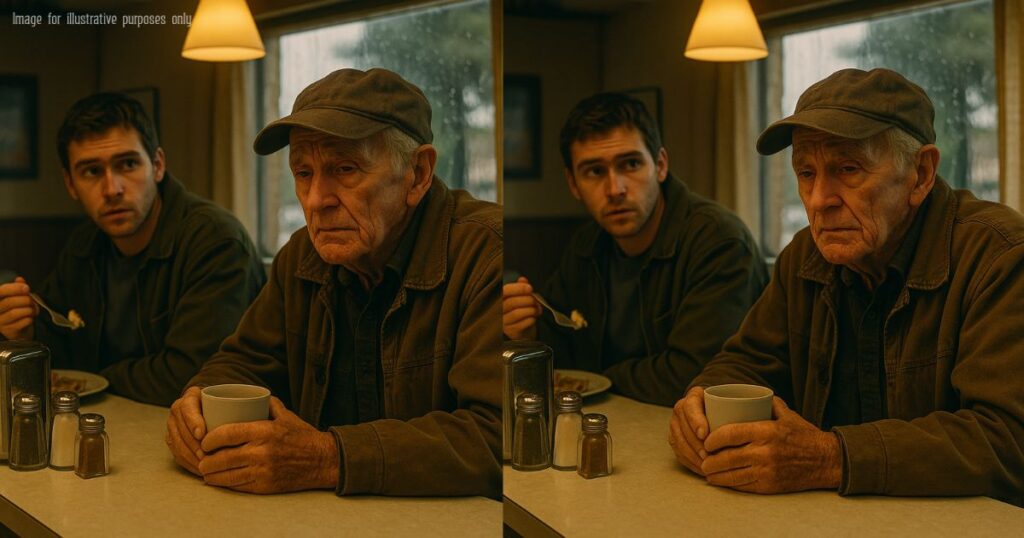“I haven’t said an honest word in forty years — and I think it’s what’s killing me.”
The young man didn’t look up at first. He was halfway through a plate of overcooked hash browns, the kind that left grease tracks on your fork. The old man sat one stool over, hunched, hands clasped around a chipped ceramic mug like it was a lifeline.
They were the only two at the counter. Rain tapped at the diner’s windows. The waitress — late fifties, tired eyes, a faded rose tattoo on her wrist — was leaning against the far end, refilling the sugar shaker. A country song crackled out from the radio above the grill.
The old man took a sip, grimaced. “Don’t worry, son. I’m not crazy. Just… unfinished.”
That got the young man’s attention.
“I worked the night shift at City Hall from ‘72 to 2012,” the old man said. “Four decades. Same desk. Same uniform. Same damn thermos. Nothing fancy. Nothing broken. I was reliable. They called me ‘Quiet Joe.’ Never complained. Never got involved.”
The young man nodded slightly, unsure whether to say something. He didn’t.
The old man continued, voice low but steady. “I saw things. Things a man should’ve spoken up about. Papers slipped under doors. Custodians getting screamed at. A secretary once locked herself in the bathroom, crying so hard the pipes rattled. I stood guard outside like a statue. Because that’s what they wanted me to be.”
He paused, staring at his hands — big, cracked knuckles, age spots, the skin like thin paper.
“They taught us early: Don’t rock the boat. Do your job. Keep your mouth shut. So I did. Forty years of keeping things shut.”
The diner hummed with silence. The young man put down his fork.
“I remember this one janitor,” the old man said, voice distant now. “Manny. Small guy. Worked two jobs. Sweetest soul. Once brought me a piece of his wife’s birthday cake, even though he barely spoke English. One night, I saw a councilman shove him. Called him a cockroach.”
He rubbed his face hard, like he could erase the memory.
“Manny looked at me like… like I was supposed to say something. Like maybe I would. I didn’t. Just stared at the wall clock until they both walked away.”
The old man’s shoulders sagged like something had finally come loose.
“Next week, Manny was gone. Fired, they said. ‘Poor work ethic.’ I knew better.”
The young man looked down at his coffee.
The old man reached into his coat and pulled out a yellowed envelope, edges soft from handling. He set it gently on the counter between them.
“This… this has everything I didn’t say. Things I should’ve told people when they were still breathing.”
The envelope trembled slightly under the humming light.
“I wrote letters,” he said. “To the mayor who buried things. To Manny’s wife. Even one to my daughter. She thinks I never cared. Truth is, I didn’t know how to show it without saying the wrong thing — so I said nothing. For forty damn years.”
He looked at the young man now, eyes sharp and wet.
“I’m dying. Doctors say it’s the lungs. I think it’s the silence. Either way, I won’t be here long.”
The young man opened his mouth, then closed it. He looked at the envelope like it might burn.
“I need someone to carry the words,” the old man said. “Someone who hasn’t forgotten how.”
Outside, the rain came harder. The radio crackled, skipped a beat. The waitress wiped her hands on her apron and glanced over, but didn’t interrupt.
The young man stared at the envelope.
And didn’t move.
This… this has everything I didn’t say.


